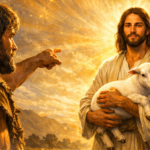“All Crossed Up” – Luke 24:1-11
Introduction: “Cross-Words” review
During the Sundays of Lent and also on Good Friday we spent time reflecting on Jesus’ words from the cross. Each Sunday another word or two would be filled in on our “Cross-Word” crossword puzzle. Well, now the “Cross-Word” puzzle is finished: “Father, forgive them.” “Today you will be with me in Paradise.” “Behold your mother… Behold your son.” “My God, my God, why have you forsaken me?” “I thirst.” “Father, into Your hands I commit my spirit.” “It is finished.” Jesus’ words from the cross are finished. In fact, the cross would seem to be quite final, regarding most things; it is, itself, the ‘final word’ on one’s life. Crucifixion was a tortuous, excruciatingly painful, and very final, form of death. You didn’t ever expect to see somebody alive again when you last saw him on a cross.
So… what we hear about today from Luke (and the other gospels) illustrates that everybody was all crossed up, confused by Jesus’ “Cross-Words,” and especially by this one very different crucifixion. Something strange had happened, something unexpected, something unexplained, something unbelievable!
1. Crossed-up… on Friday!
Let’s take a look at the chronological order of events and reactions that followed the crucifixion. Things were strange and unexpected already on Friday. First of all, it was a quick trial because Passover was approaching, and the Sabbath, too. The Jewish religious leaders – the Pharisees and the chief priests – they wanted to have all of this trial and crucifixion stuff done so that they could celebrate the Passover on time. Isn’t that something?? They wanted to get all their sins over and done with so that they could be religious!! That’s pretty hypocritical, isn’t it?!?! Besides, no one was allowed to work on the Sabbath – which incidentally, began at sundown of Friday. So, they had to have all the criminals buried by about 6:00 or so. Isn’t that different from today?? People are forced to work on Sundays, even on Easter, if they want to keep their jobs. And today, if you want workers to prepare a grave for a burial on Saturday, you have to pay them overtime. In Jesus’ day it was just plain forbidden. No grave digging period! after 6:00 Friday.
On the cross, one of the guilty criminals recognized Jesus as having done nothing wrong, and then asked Jesus – a dying man!! – to remember him when He came into His kingdom. That was strange, confusing. What kind of kingdom, what kind of kingship is a dying man going to have? And yet a criminal draws that crossed-up, surprising kind of conclusion.
Equally strange and confusing was the remark of the Roman centurion charged with overseeing these three crucifixions. Luke reports him saying, “Surely this was a righteous man.” That is to say, “We made a mistake crucifying this guy. There’s something different, unusual, even holy about this man. I don’t think he deserved to die.” Mark has a slightly different version: “Surely this man was the Son of God!” How could a Roman soldier who probably knew next to nothing about Judaism, about religion, call this crucified, now-dead, man the Son of God? How could this centurion who had probably never met Jesus, never heard Him speak, never seen Him do miracles… how could he come to the realization that this pathetic excuse of a human being is the true Son of God? He was all crossed-up!
Matthew tells us about some unexpected events that happened right at the time of Jesus’ death – the temple curtain was torn in two; there was an earthquake; tombs broke open and dead people came to life. Pretty unbelievable, huh??
2. Crossed-up… on Saturday!
On Saturday, the Sabbath, the chief priests and Pharisees again couldn’t figure things out. They took precautions. They went to Pilate – probably not close to him because they didn’t want to become unclean from this Gentile governor – they went to Pilate and asked him to make the tomb more secure, because they feared the disciples might steal Jesus’ body and deceive people into believing that Jesus had risen from the dead as He had predicted. They were confused. They were fearful. They were conniving. But Pilate consented, and guarded the tomb of a dead man.
3. Crossed-up… on Sunday!
a. The women
Now, because the Sabbath was coming quickly, there had been no time to properly prepare Jesus’ body for burial. Joseph and Nicodemus had wrapped the body quickly with a mixture of myrrh and aloes. But, it was Sunday morning, after the Sabbath, when the women came to do the anointing job right. They forgot all about the stone in front of Jesus’ tomb until they were almost there. But… when they arrived, they were all crossed up: the stone had been rolled away! So, they go in to investigate. What they expected to see was the familiar, but dead, body of their friend, Jesus. What they did see crossed them up and confused them… they saw two gleaming messengers, alive and well. Now, that’s unusual to say the least. And it caused them to be afraid – can you imagine their knees shaking, their teeth chattering, their bugged-out eyes! They probably stood there, paralyzed, in shock! The message did no less. The gleaming messengers asked: “Why do you look for the living among the dead?” If nothing else crossed them up, the message would, for they were certainly not looking for a live person in that tomb. Mark’s Gospel cuts this story short by saying abruptly: “Trembling and bewildered, the women went out and fled from the tomb.”
b. The disciples
The next ones to be crossed up were the disciples – Luke calls them the Eleven… remember it was the Twelve minus Judas. The women evidently reported what they had seen and heard. Now the disciples could not believe what they were hearing. They said it was nonsense! An April Fool’s Joke! “You must have been to the wrong tomb; you must be hallucinating, what are you on? Were you drinking too much last night? That’s an outright lie!”
c. The disciples
Luke tells us that a couple of other followers were next to hit the dust. They were literally hitting the dust, walking home to Emmaus on Easter afternoon. It was seven miles from Jerusalem to Emmaus, just a nice distance for a leisurely 2-hour Sunday afternoon walk. It must have been a well-travelled road, for soon a stranger was walking with them. They talked to this stranger about Jesus, and how they had hoped that He was the Redeemer of Israel. But now He had been crucified and they were all crossed up. They also mentioned that some were reporting that He was alive, but that they had not seen Him, and that made things even more confusing. They didn’t know what to think, until this stranger (who, of course, was Jesus Himself) explained the Old Testament to them, and how the Saviour was meant to suffer and die, and then, having been convinced to stay for supper – they must have been Lutherans – Jesus broke bread. Then, and only then did things begin to make sense. But Jesus disappeared from their sight… more confusion!
d. Thomas
Thomas, one of the disciples, was all crossed up, too. (We’re going to hear his story next Sunday.) Even after the other disciples affirmed that they had seen the living Jesus, he could not believe until he had seen and touched Jesus with his own hands. It was too incredible!
e. Jewish leaders
Even the Jewish officials were flabbergasted by the events and reports concerning that Sunday. Matthew 28 reports that the chief priests and elders bribed the tomb guards not to tell the truth and, in fact, to circulate a lie. It says that they gave the soldiers a large sum of money and told them to file their report as follows: “His disciples came during the night and stole Him away while we were asleep.” The Jewish officials promised to ‘satisfy’ the governor, too, if need be, so that the soldiers would not get into trouble. You wouldn’t want a court-martial in the Roman military!
f. You?
What about you?? Do the events surrounding the end of Jesus’ life cross you up? Are you confused by them? Do they evoke fright in your heart, like the women? Are you filled with skepticism, unbelief – like Thomas and the other disciples – at the ‘nonsense’ news that a crucified man could/would be alive? Maybe you kind of go along with the whole thing, but just in the understanding that this is a nice story – and really the resurrection is impossible, and at best Jesus only came alive spiritually, in the minds and hearts and spirits of His disciples.
4. The facts and the explanations
Let me tell you a few facts about those few days….
Jesus actually died – he was dead!! Crucifixion claims the lives of its victims by suffocation – always, 100% of the time! Jesus was no exception! All four Gospel accounts record that He died. If the crucified man doesn’t die in time for the guards to go for coffee, they break his legs so he can’t brace himself up and enable himself to breathe. Breaking legs makes him suffocate. The Gospel of John reports that they didn’t have to break Jesus’ legs – he was dead already. But they did pierce His side with a spear – and immediately blood and water flowed from his side. Doctors have indicated that this shows that He was in fact dead. Besides… Mark tells us: “Joseph of Arimathea… went boldly to Pilate and asked for Jesus’ body. Pilate was surprised to hear that He was already dead. Summoning the centurion, he asked him if Jesus had already died. When he learned from the centurion that it was so, he gave the body to Joseph.” Both the centurion and Pilate, who were rather neutral observers, were convinced that Jesus was dead. Then and only then did Pilate give permission for burial. The Gospels all tell us that Jesus was buried! A stone was rolled in front of the cave-like sepulchre, it was sealed and an armed guard was placed there to protect the grave. There was no hiding, no denying the fact that Jesus actually died.
Another fact: On Sunday morning the tomb was empty. There is no argument in history about whether or not the tomb was empty. It was! The disciples didn’t deny it; the Jews didn’t deny it (although they made up a lie about how it happened); the Romans didn’t deny it. There was no decaying body to point to, no bones to prove that Jesus was still dead. The tomb was empty! No question!
So… what happened to Jesus? What explanations are possible?
- The Romans took Jesus out. NOPE! They were trying to avoid being drawn into the religious arguments of the Jews – they would never open this can of worms by stealing the body. To the guards, this man was no more important than any other man – they didn’t care! (But they did care enough to take a bribe to perpetrate a lie.)
- The Jews took Jesus out. NO WAY! This was precisely the myth they were trying to guard against by asking for the tomb to be sealed and guarded by the soldiers. They knew Jesus had predicted coming back to life. They would not make it look like Jesus had risen and so give opportunity for a lie about resurrection to spring up. Jesus’ enemies would certainly not remove His body! Their fondest wish would have been to point to Jesus’ bones to dispel any claims that Jesus was alive.
- The disciples took Jesus out. They certainly had a motive – Jesus was their friend, He had predicted it. But NO, the disciples couldn’t have removed and hidden Jesus. How could a motley crew of fishermen, tax collectors and riff-raff, who had just a couple of nights earlier deserted Jesus in the midst of a tame crowd coming to arrest Him, how could they now face and defeat an armed guard of Roman soldiers and break into a sealed tomb? What if they were caught? They perhaps could expect the same fate of crucifixion as Jesus. And if they did steal His body, how could they all, save one, die as martyrs for this lie which they had concocted? And how could these men, who mere weeks later were called idiotes – unschooled idiots – by the Jewish leaders… how could they have created a hoax that has deceived a much more sophisticated humanity for the last 2,000 years. No, the disciples couldn’t have taken His body, and they wouldn’t have either.
5. The hidden “Cross-Word” message
So what’s left?? What possibility?? Oh, just a minute… I forgot the Cross-Word phrase. You see, there was to be a secret message in the Cross-Word puzzle hidden in the intersecting letters: “HE IS RISEN.”
Yes, that’s a possibility! In fact, it’s the only possibility, it’s the only explanation – and it’s the truth! He is not here! He has risen, just as He said! He is not dead – our Lord Jesus – but He is alive! both now and forever! Alleluia! He did die…the tomb was empty… and He arose. Consider all the witnesses of the resurrected Jesus that Paul cites in 1 Corinthians 15. Several different appearances – to Peter, to the Twelve, to James, to all the apostles, in fact, over five hundred people in all saw Jesus alive after He had died – Yes, He did come back to life! Yes, He is alive! That’s the message of Easter, that’s the great news of Easter, that’s the great news of Christianity! Jesus is alive!
6. The meaning & implication of the resurrection
After the initial ‘shock’ (surprise) of the resurrection, the disciples were compelled from within to proclaim the resurrection and its implications in and for the lives of all people. Only the 1st four books of the New Testament deal with Jesus’ life, death and resurrection. All the other books deal with the proclamation of and the meaning of the resurrection: Listen to the proclamation about and the meaning of the resurrection as highlighted in some other New Testament books:
“You killed the author of life, but God raised Him from the dead. We are witnesses of this…”
“It is by the name of Jesus Christ of Nazareth, whom you crucified but whom God raised from the dead, that this man stands before you healed… Salvation is found in no one else…”
“Now if we died with Christ, we believe that we will also live with Him.”
“He who raised Christ from the dead will also give life to your mortal bodies through his Spirit, who lives in you.”
“For as in Adam all die, so in Christ all will be made alive.”
“Praise be to the God and Father of our Lord Jesus Christ! In His great mercy He has given us new birth into a living hope through the resurrection of Jesus Christ from the dead, and into an inheritance that can never perish, spoil or fade – kept in heaven for you.”
These implications of the resurrection have never ceased to be, they are valid also for us. Through the resurrection of Jesus we, too, have the promise of forgiveness of sins, we, too, have the power of the living Lord as part of our lives as His people, we, too, have the guarantee of salvation, the inheritance of eternal life that never perishes, spoils or fades. This is the joy of Easter; this is the joy of the Christian life – to know that Jesus’ resurrection was real and that His resurrection affects us in our lives in a most favourable way. Easter means life, victory, hope, salvation. Easter brings us out of spiritual darkness into spiritual light. The implications of Easter create a deep, lasting, inner joy that nothing in all the world can ever take away or erase… or cross up for us.
Everyone on that first Easter may have been crossed up, but thanks to the proclamation of Peter and Paul and others, the message and the results of the resurrection are clear now.
Let me encourage you, in closing, to continue the proclamation of the resurrection in and through the ministry of this congregation, and in and through your individual lives. For that resurrected Jesus still does bring life, hope, salvation, joy into the lives of people.
He is risen! He lives! He brings life! Let that be your hope and strength. Let that be your proclamation! Let that be your joy and your song! Amen.







